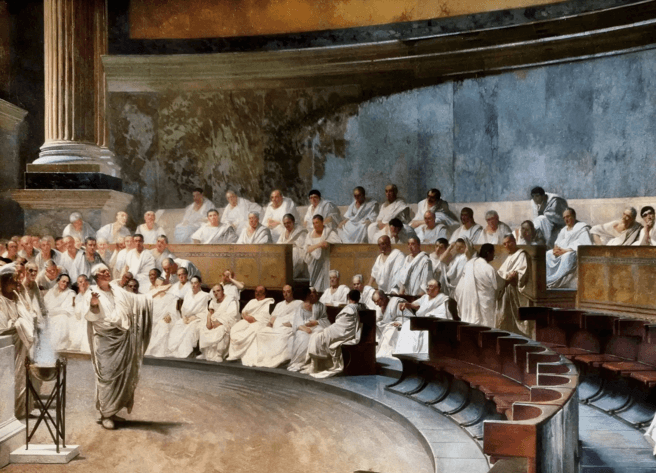The Bedraggled Senate
As Senator Schumer abandons a dress code for the Upper House, maybe it’s time for the solons to bring back the dress code of the senators who inspired the Founding Fathers.

The New York Sun is happy to be the first newspaper to endorse Senator Manchin’s proposal to restore the dress code that for years has obtained in the upper chamber. It seems that over the weekend the majority leader, Senator Schumer, without so much as a howdy do to either caucus, cast aside the requirement for jacket and tie for men and business dress for women. The idea was to accommodate the junior solon from Pennsylvania, Senator Fetterman.
We can admire the instinct. Mr. Fetterman appears to be not entirely in control of his faculties. We could even see giving him a one-senator exception to the rules to address his medical issues. The dress code writ large, though, is not about special regard for any individual. It’s about regard for the Upper Chamber as an institution — and, more broadly, for the American states whom the Senate represents.
This is no small issue in our fractious times. The senate was envisioned by the framers, as Madison explained it, as the “great anchor” of the government, serving, in part because senators were selected by the state legislatures, as a “necessary fence” to thwart the “fickleness and passion” of popular opinion, as represented in the lower house of the Congress. Hamilton saw no other body than the Senate as “sufficiently dignified, or sufficiently independent.”
The senators were conscious of this role. Vice President Burr in 1805 reminded the senate that it was “a sanctuary; a citadel of law, of order, and of liberty.” Senator Sumner in 1866 marveled that the body and its rules were in effect “the very temple of constitutional liberty.” Sumner knew whereof he spoke. In 1856 the solon was at his desk in the senate when a representative, Preston Brooks, entered the chamber and beat Sumner with a metal-headed cane.
The incident, Senator Byrd of West Virginia once observed, was among those illustrating how, absent adherence to the chamber’s rules of decorum, “events in the Senate can escalate, and have escalated, out of control.” He pointed to episodes like Senator Foote in 1850 drawing a pistol on Senator Benton, and Senator Gain in 1859 challenging to a duel Senator Wilson. In 1863, Byrd noted, one senator “threatened to shoot the Sergeant at Arms.”
Byrd saw the rules of the Senate, with their emphasis on “order and decorum,” as critical to the upper chamber’s role as what has been called “the world’s greatest deliberative body.” It was Jefferson who set out these rules, Byrd noted, barring senators from disturbing speakers “by hissing, coughing, spitting, speaking, or whispering,” or even, during a speech, “to go across the house, or walk up and down it, or take books or paper from the table, or write there.”
Such rules may seem picayune, yet they set the conditions for the senate’s ability to act dispassionately. As Vice President Stevenson warned, “great evils often result from hasty legislation.” While the Senate never codified what its members could wear, tradition called for what CNN calls “business attire, including that men should wear a coat and tie in the chamber, and that women should wear dresses with their shoulders covered or pantsuits.”
Which brings us back to the Mountain State maverick and his call to restore the Senate’s decorum in dress. Mr. Manchin is joined in this by Senator Durbin, who notes that while Mr. Fetterman “is a personal friend,” there is a “need to have standards when it comes to what we’re wearing on the floor of the Senate.” It’s gratifying to see this has the makings of a bipartisan effort, with Senator Cornyn calling advocates of the restoration a “coalition of the rational.”
It’s a commendable effort to hold the line. It also raises echoes of the old Roman Senate. The dress code of the ancient senate was the toga, described by one historian as “a garment worthy of the masters of the world,” but one that required extra effort to don correctly due to its folds. If Mr. Schumer dislikes the suit and tie, maybe our solons should be required to wear the garb of the Senate that inspired our Founding Fathers.

